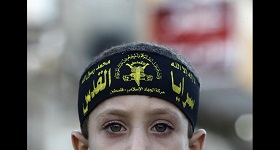Nasr al-Ansi, a commander of the predominantly Yemen-based terrorist organisation al-Qaeda in the Arabian Peninsula (AQAP), recently made a statement in which he announced the organisation’s involvement in the shootings of the Charlie Hebdo editorial staff on 7 January, 2015 in Paris.
Nasr al-Ansi, a commander of the predominantly Yemen-based terrorist organisation al-Qaeda in the Arabian Peninsula (AQAP), recently made a statement in which he announced the organisation’s involvement in the shootings of the Charlie Hebdo editorial staff on 7 January, 2015 in Paris [1]. . This act of terrorism was the biggest in AQAP’s history outside Yemen and was nothing other than revenge for the honour of the prophet Muhammad. At the same time, according to statements by the leader of the group the attack was carefully planned, with France being chosen because of its “obvious role in the war against Islam” [2].
Al-Ansi’s statement was no coincidence and fully justified. In fact in 2011 Saïd, one of the two Kouachi brothers who carried out the attack on Charlie Hebdo, arrived in Yemen to undergo training with AQAP [3]. It’s noteworthy that Arab Spring events began in Yemen at the beginning of 2011, which led to an escalation of the conflict between the ex-president Ali Abdullah Saleh and the al-Ahmar family, which headed the Hashid tribal confederation. This was followed by armed clashes in the capital Sana’a, which flared up again periodically right up to the moment when Saleh stepped down from the post of president. This led to the emergence in Yemen of at least several dozen private places of study which took in foreigners from every corner of the world with the aim of subsequently enrolling them in AQAP [4].
The attack on the French weekly’s editorial staff was the first successful operation by the Yemeni branch of al-Qaeda outside the Arabian Peninsula. This event was an undoubted triumph for the AQAP “brand” and its twin-pronged strategy to spread jihad within Yemen and beyond its borders. Moreover this success could not have come at a better time for the group – a whole string of failures suffered recently by AQAP fighters against the Ansar Allah movement in North Yemen had forced them to move south and base themselves mainly in Yemen’s Abyan province, which significantly weakened the terrorist organisation’s position.
Formed in 2009 after the merger of the Yemeni and Saudi branches of al-Qaeda [5], AQAP repeatedly took part in acts of terrorism aimed at American targets. For example, in 2009 there was an unsuccessful attempt to blow up an airliner heading from Amsterdam to Detroit, using explosives concealed in a suicide bomber’s underwear [6], and a year later there was an attempt to send bombs hidden in toner cartridges by post on aircraft flying from the Gulf to the USA [7]. In both cases the explosives were said to have been made by one of AQAP’s leaders – Ibrahim al-Asiri.
The AQAP’s leader, Nasr al-Vashihi, was himself for many years a personal assistant to Osama bin Laden before returning to his homeland Yemen, where he became head of a terrorist organisation [8]. His close links with bin Laden enabled al-Vashihi to command great respect among terrorists in the Middle East and North Africa, and his emphasis on close cooperation with al-Qaeda branches in Africa, Iraq and Syria enabled AQAP to win a special place in the hierarchy of terrorist organisations in the region.
In addition, AQAP was the first to focus on English-language publications in order to recruit supporters in the West. Thus 2010 saw the publication of Inspire, its first English-language magazine [9]. At the same time AQAP made repeated threats to the French weekly, including its editor Stéphane Charbonnier, who was one of the twelve people killed on 7 January 2015 in the French capital: in 2013 he had featured in the list of top enemies of Islam, published by Inspire [10]. A recent issue of Inspire published in 2014 said bluntly that the crimes of the USA, the United Kingdom and France would have negative consequences for them, emphasising its adherence to the strategy of Ayman al-Zawahiri to “cut off the head of the serpent until the West retreats” [11].
It should be noted that AQAP has shown itself to be quite a vital force, constantly trying to cooperate with other terrorist groups, including the recently formed “Islamic State”. And this is primarily linked with the policy pursued by the USA in the Middle East. Attempts to provoke conflict in the region invariably lead to the creation of radical groups of this kind, whose support and attraction are based on the image of the Islamic world’s external enemy, and the USA’s inability to maintain dialogue with all political forces in the region only aggravates an already difficult situation. The same can be said of Washington’s reluctance to compromise with al-Asad and Iran with regard to countering “Islamic State”. This is also fair with regard to Yemen. The USA’s deliberate support for the al-Islah Islamist party, led by the al-Ahmars, which joined an alliance with the Yemeni cell of the Muslim Brotherhood and the Salafist an-Nusra, and its reluctance to recognise the Ansar Allah movement – currently the only force really fighting AQAP within Yemen – is stark confirmation of this.
1. http://www.kommersant.ru/doc/2645758.
2. Al-Qaeda urges more international jihad // National Yemen, January 12, 2015, Issue 205, p. 1.
3. Idem.
4. Isayev, L.M., Shishkina, A.R., Syria and Yemen: Unfinished Revolutions. Moscow, URSS, 2012.
5. http://www.cfr.org/global/global-conflict-tracker/p32137#!/?marker=9.
6. http://www.gazeta.ru/news/seealso/1439760.shtml.
7. http://edition.cnn.com/2010/WORLD/meast/11/05/yemen.security.concern/?hpt=T2.
8. http://www.csmonitor.com/World/Middle-East/2010/1102/Five-key-members-of-Al-Qaeda-in-Yemen-AQAP/Nasir-al-Wuhayshi-head-of-AQAP.
9. http://www.adl.org/combating-hate/international-extremism-terrorism/c/inspire-magazine-issue-1.html#.U0MLjVfQt-0.
10. http://www.slate.com/blogs/the_world_/2015/01/07/stephane_charbonnier_
the_editor_of_charlie_hebdo_was_on_an_al_qaida_magazine.html.
11. http://www.dailymail.co.uk/news/article-2905276/Al-Qaeda-publishes-recipe-easy-make-bomb-evade-airport-check-determined-Muslim-prepare.html.






